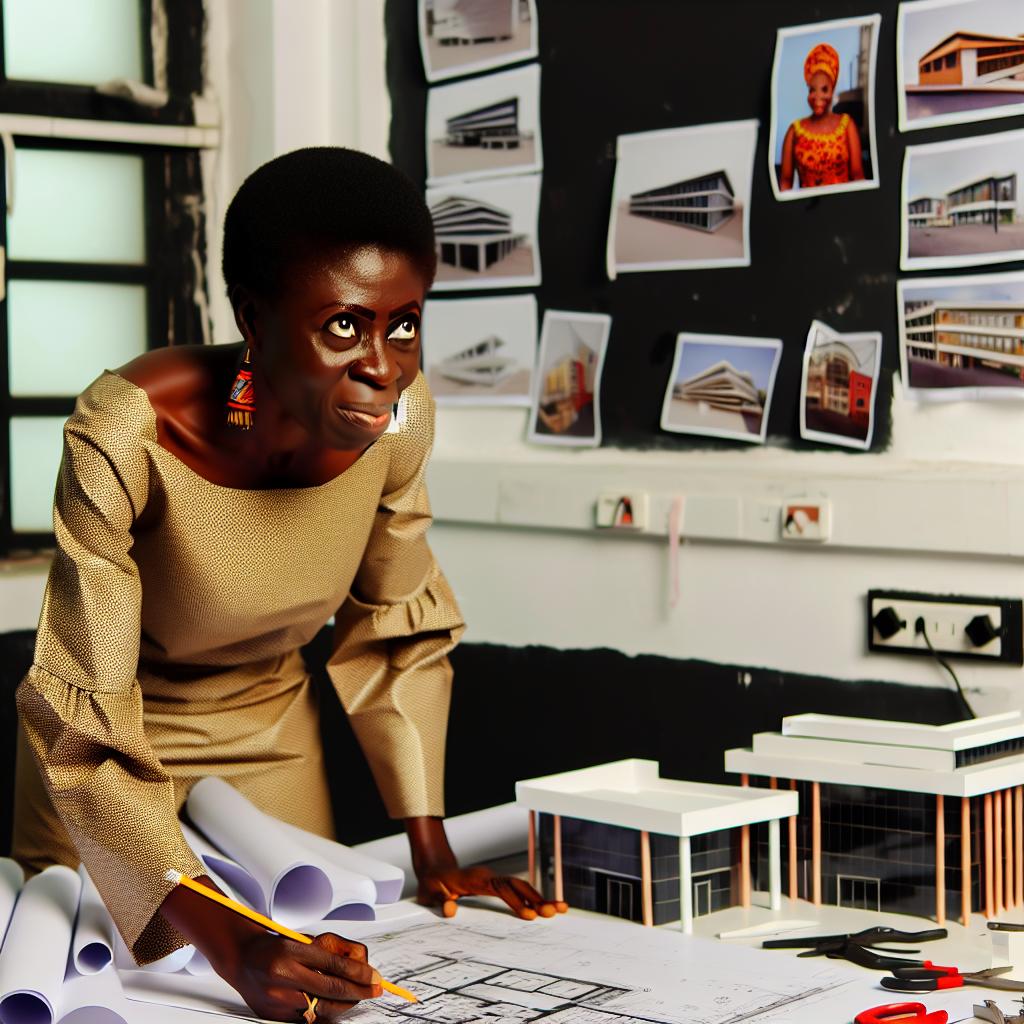Introduction
Architecture plays a crucial role in shaping the physical landscape of Nigeria.
Several renowned Nigerian architects have made significant contributions to the country’s architectural scene.
These architects have left a lasting impact with their iconic works, which have not only transformed the skyline but also reflect Nigeria’s rich cultural heritage.
Early Pioneers of Nigerian Architecture
Joseph Olumide Sanu (1915 – 1985)
Known for blending traditional Nigerian architecture with modern styles.
Iconic works include the National Arts Theatre in Lagos.
Demas Nwoko (b. 1935)
Renowned for his use of indigenous materials in architectural designs.
Contributed to the development of the New Culture Movement in Nigeria.
Josiah M. Olumide (b. 1923)
Pioneer in the use of concrete in Nigerian architecture.
Notable works include the Faculty of Science building at the University of Lagos.
Contributions to the Field of Architecture
Joseph Olumide Sanu
Pioneered the use of traditional Nigerian motifs in modern architecture.
Influenced a generation of architects to embrace cultural heritage in their designs.
Demas Nwoko
Advocated for sustainable architecture practices using local materials.
Founded the African Art and Culture Project, promoting indigenous art and architecture.
Josiah M. Olumide
Introduced innovative construction techniques in Nigerian architecture.
Inspired a new wave of architects to explore the potential of concrete in design.
Contemporary Nigerian Architects
As the architecture industry in Nigeria continues to evolve, there are several talented architects who are making waves and pushing boundaries with their innovative designs.
Here are a few contemporary Nigerian architects who are leaving a mark in the industry:
Kunlé Adeyemi
- Known for his sustainable and socially conscious designs.
- Iconic Work: Makoko Floating School in Lagos.
- Recognized on an international level for his innovative approach.
- Blends architecture with environmental and social considerations.
- Challenges conventional architectural norms and stereotypes.
Olajumoke Adenowo
- An award-winning architect with a focus on luxury designs.
- Iconic Work: The new Maryland Mall in Lagos.
- Pioneer of contemporary African architecture.
- Known for her grand and opulent architectural style.
- Empowers women in architecture and design.
Tosin Oshinowo
- Architect and founder of CMDesign Atelier.
- Iconic Work: The Maryland Eye Care Center in Lagos.
- Combines functionality with aesthetic appeal in her designs.
- Advocates for sustainable architecture practices.
- Uses her platform to mentor and inspire young architects.
These contemporary Nigerian architects are paving the way for a new era of architecture in Nigeria.
They showcase not only their talent but also their commitment to pushing the boundaries of design and innovation.
Explore Further: Surveying in Rural vs. Urban Areas: Key Differences
Influences on Nigerian Architecture
When examining the influences on Nigerian architecture, it is important to consider the cultural, historical, and environmental factors that have shaped the work of famous architects.
Cultural Influences
- Nigerian architecture is heavily influenced by the diverse cultures and traditions that exist within the country.
- Traditional building techniques and materials have been incorporated into modern architectural designs.
- Artistic motifs and symbols from various Nigerian ethnic groups are often integrated into architectural elements.
- There is a strong emphasis on creating spaces that reflect the cultural identity of the people who inhabit them.
Historical Influences
- The colonial period in Nigeria had a significant impact on the architecture of the country.
- European architectural styles were introduced and blended with traditional Nigerian architecture.
- Post-independence, Nigerian architects began to reclaim their cultural heritage and incorporate it into their designs.
- The history of slavery and the transatlantic slave trade also influenced the architectural forms and motifs in Nigeria.
Environmental Influences
- Nigeria’s diverse climate and geography play a crucial role in shaping architectural designs.
- Architects must consider factors such as temperature, humidity, and rainfall when designing buildings.
- Sustainable architecture practices are increasingly being adopted to minimize the environmental impact of construction.
- Local materials are often used to create structures that are adapted to the climate and natural surroundings.
These cultural, historical, and environmental influences on Nigerian architecture contribute to the unique and diverse architectural landscape in the country.
Famous architects have drawn inspiration from these factors to create iconic works that celebrate Nigeria’s rich heritage and embrace its future.
Find Out More: Scholarships for Marine Engineering Students in Nigeria
Iconic buildings in Nigeria
National Arts Theatre, Lagos
The National Arts Theatre, located in Iganmu, Lagos, is one of the most iconic structures in Nigeria.
The theatre was designed by Architect Godwin M. Alus-Chukwu and completed in 1976.
This landmark has a capacity of 5,000 people and serves as a venue for various cultural performances and events.
Due to its unique architectural design and cultural significance, the National Arts Theatre is a symbol of Nigeria’s rich artistic heritage.
The Octagon, Accra
The Octagon, a modern office complex located in Accra, Ghana, was designed by Nigerian architect, Seun Oduwole.
This building is renowned for its innovative design, incorporating sustainable features and cutting-edge technology.
The Octagon serves as a hub for business activities in Accra and is a testament to Oduwole’s architectural prowess.
Civic Centre, Lagos
Designed by Architect Adunni Bankole, the Civic Centre in Lagos is a multi-purpose events venue that hosts a wide range of functions.
With its striking architectural design and versatile spaces, the Civic Centre has become a popular choice for weddings, conferences, and social events.
This iconic building stands as a testament to Bankole’s creativity and vision.
Transform Your Career with Expert Guidance
Get personalized mentorship consulting that’s tailored to your unique path. Our expert advice is actionable and exclusive.
Get StartedCentral Bank of Nigeria Headquarters, Abuja
The Central Bank of Nigeria Headquarters in Abuja was designed by Architect Alhaji Bamanga Tukur.
This impressive structure serves as the central bank’s administrative headquarters.
Tukur’s design incorporates elements of Nigerian culture and history, making it a symbol of the nation’s financial strength and stability.
Nigerian Stock Exchange Building, Lagos
The Nigerian Stock Exchange Building in Lagos, designed by Architect Fola Alade, is a symbol of Nigeria’s economic prowess.
This modern and functional structure houses the country’s primary stock exchange and financial institutions.
Alade’s design reflects the importance of the financial sector in Nigeria’s development.
These iconic buildings in Nigeria showcase the talent and creativity of Nigerian architects.
They also stand as symbols of the nation’s cultural heritage and economic strength.
Each of these structures tells a unique story and contributes to the architectural landscape of Nigeria in its own way.
Discover More: Marine Engineering Internships and Apprenticeships

Challenges and Opportunities in Nigerian Architecture
Challenges Faced by Architects in Nigeria:
Limited access to funding for architectural projects.
Lack of government support for architectural initiatives.
Insufficient infrastructure and resources for architects to work effectively.
Limited opportunities for young architects to gain experience and showcase their talent.
Lack of adherence to building codes and regulations in the construction industry.
Difficulty in obtaining necessary permits and approvals for architectural projects.
Competition from established architectural firms and foreign architects in the market.
Inadequate training and education for architects in the country.
Limited recognition and appreciation for the importance of architecture in Nigerian society.
Challenges in integrating new technologies and sustainable practices in architectural design.
Opportunities for Growth and Development in the Field:
Increasing demand for innovative and sustainable architectural solutions in urban development.
Collaboration opportunities with international firms to bring in new ideas and expertise.
Rising interest in cultural preservation and heritage conservation projects.
Expansion of the real estate industry creating more opportunities for architects.
Development of new building materials and technologies to improve construction processes.
Government initiatives to promote local architecture and design talent.
Growing awareness of the importance of green building practices and sustainability.
Opportunities for architects to specialize in emerging fields such as healthcare and education design.
Increased focus on community empowerment and participatory design in architectural projects.
Potential for architects to make a significant impact on the urban landscape and improve living standards in Nigeria.
Gain More Insights: Irrigation Systems Designed by Agricultural Engineers
Famous Nigerian Architects and Their Iconic Works
Nigeria boasts a rich architectural heritage filled with talented architects and iconic structures.
One such architect is Demas Nwoko, known for his innovative blend of modern and traditional Nigerian architecture.
Nwoko’s iconic work includes the Nekede Zoo in Owerri, a structure that showcases his unique design approach.
Another notable architect is Kunle Adeyemi, founder of NLÉ Architects, known for his sustainable and socially responsive designs.
Adeyemi’s most famous work is the Makoko Floating School in Lagos, a groundbreaking project that addresses the challenges of urbanization.
Architect David Adjaye is renowned for his contemporary designs that reflect the cultural identity of Nigeria.
Adjaye’s notable works include the Alara Concept Store in Lagos, a space that seamlessly blends art, fashion, and architecture.
These architects have not only left a mark on the Nigerian architectural landscape but have also inspired future generations of designers.
Their iconic works serve as a testament to the power of architecture in shaping the identity and future of Nigeria.
Architectural Contributions and Legacy
The contributions of famous Nigerian architects and their iconic works are paramount in shaping the architectural legacy of the country.
Innovative designs showcase the rich cultural heritage of Nigeria and pave the way for future architectural developments.
Architecture plays a crucial role in defining the identity and future of Nigeria. These architects have set a high standard for excellence in the field.
Additional Resources
Code of Ethics | National Society of Professional Engineers
Adekunle Adekunmisi – Host & Creative Director – LinkedIn Nigeria




